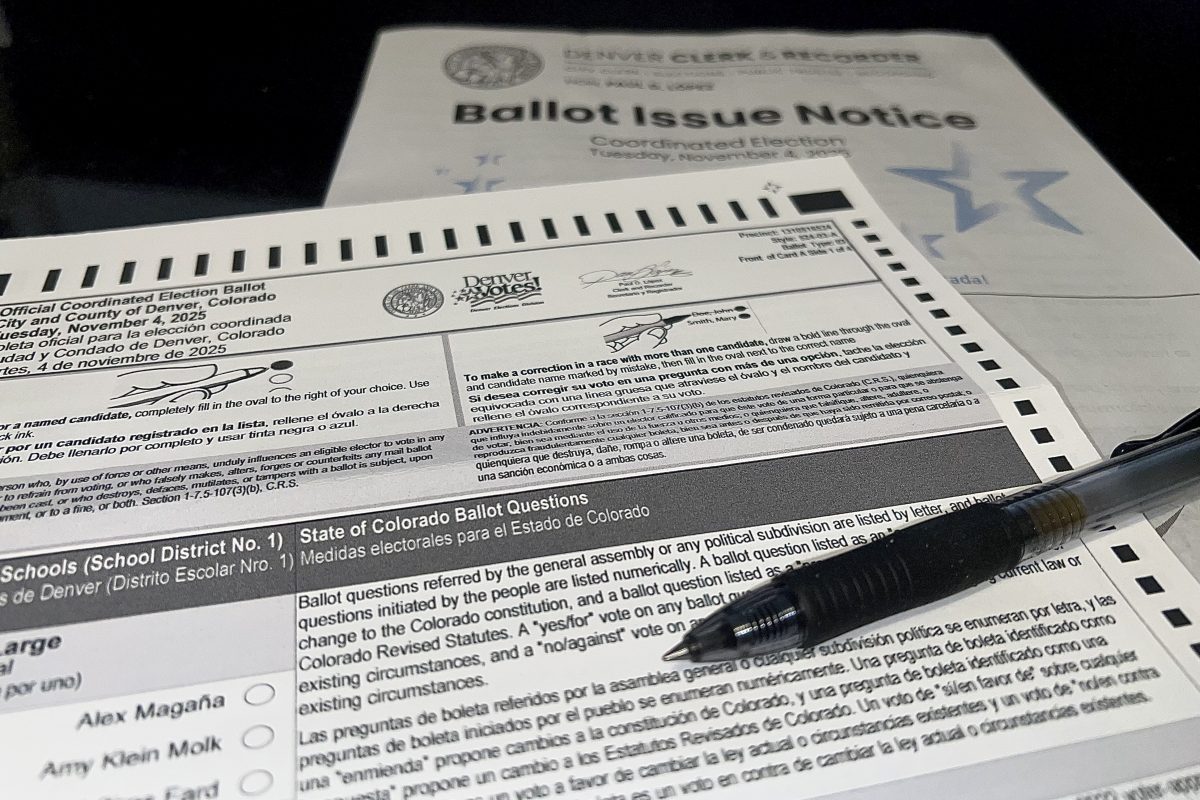
Hannah Metzger

Audio By Carbonatix
Colorado voters, it’s time.
It’s been nearly a month since state election officials began sending out ballots, giving Coloradans a preview of the various issues they’ll be asked to weigh in on come Election Day, November 4. Residents can check and update their voter registration at sos.state.co.us.
There are only two statewide initiatives on the ballot this year, but there are also numerous municipal ballot measures in different counties. In Denver, there are eight municipal initiatives this November, including an effort to uphold the city’s ban on flavored tobacco products and five measures to invest nearly $1 billion in infrastructure improvements.
Both statewide measures, Propositions LL and MM, revolve around the Healthy School Meals for All program, which provides all public school students in Colorado access to free breakfast and lunch. Voters approved the creation of the program in 2022, with the passage of Proposition FF.
Here is how the program will be affected by the new ballot measures:
Statewide Ballot Measures
The Healthy School Meals for All program was funded by raising taxes for households that make over $300,000 per year, limiting their state income tax deductions. That tax revenue has exceeded what state analysts predicted it would be in 2022.
If passed by voters, Proposition LL would allow the state to keep the roughly $12 million in excess revenue that it has already collected and spend it on the school meals program. The measure would also allow the state to keep all of the money the tax generates in the future, rather than ask voters for permission every time the revenue exceeds projections.
If Prop LL fails, the roughly $12 million will be refunded to taxpayers with annual household incomes of over $300,000.
Meanwhile, Proposition MM seeks to increase the funding source for the school meals program.
Due to the program’s popularity and rising food costs, it is not fully funded, despite the 2022 tax change generating more revenue than expected. It faces a projected budget shortfall of up to $50 million this year, CPR reported. Without additional funding, program administrators have said they will have to restrict eligibility for free school meals to only low-income students and schools.
If Prop MM passes, it would raise taxes by $486 per year for households earning over $300,000 annually by further limiting their state income tax deductions. That would generate around $95 million annually, according to state estimates.
The money could also be spent to increase wages for school cafeteria workers and to help schools purchase food from local farmers. If the school meals program is fully funded, the funds would be allocated to support SNAP, the low-income food assistance program.
Both measures were referred to the ballot by the State Legislature.
Denver Ballot Measures
For voters who live within Denver, the November ballot will also feature eight municipal measures, five of which are part of Mayor Mike Johnston’s Vibrant Denver bond package. The five measures total $950 million to fund city infrastructure projects via general obligation bonds, meaning the money is repaid through property tax revenues that cannot be transferred to the general budget.
If passed, here is what each of the municipal ballot measures would do:
Referendum 310: Uphold the ban on selling flavored tobacco products within Denver, such as vapes, e-cigarettes, menthol cigarettes and flavored nicotine pouches, like Zyn. The ban was passed by the City Council last December but has not yet taken full effect, with the official enforcement date scheduled for January 1, 2026.
Ballot Issue 2A: Approve $441,420,000 in general obligation bonds to fund transportation and mobility infrastructure projects, improving streets, bridges and traffic safety. Specific projects include multimodal and safety enhancements for the Santa Fe Arts District, West 38th Avenue, Evans Avenue, the West 38th and Blake underpass, and the 49th and Marion underpass.
Ballot Issue 2B: Approve $174,750,000 in general obligation bonds to fund parks and recreational infrastructure projects, expanding and upgrading city parks, playgrounds and pools. Specific projects include making the Park Hill open space into a park, improving the environmental health of Sloan’s Lake, creating a new Emporia neighborhood park, and creating a Southeast recreation center and skate park.
Ballot Issue 2C: Approve $30,100,000 in general obligation bonds to fund repairs and improvements to health and human services infrastructure. Specific projects include building a new Denver Health family health center and expanding the Denver Children’s Advocacy Center.
Ballot Issue 2D: Approve $244,430,000 in general obligation bonds to fund repairs and improvements to city facilities like libraries and art, cultural and community centers. Specific projects include renovating the Denver Animal Shelter, building a new first responder training center, and improving the Denver Art Museum, Denver Botanic Gardens, Denver Zoo and Red Rocks Amphitheater.
Ballot Issue 2E: Approve $59,300,000 in general obligation bonds to fund repairs and improvements to housing and shelter facilities. Specific projects include building affordable housing, making shelters accessible to people with disabilities, and locating affordable housing near city facilities, like libraries.
Referred Question 2F: Rename the Department of Excise and Licenses to the Department of Licensing and Consumer Protection, as part of the city’s effort to modernize and make it easier to understand government agency services.
Referred Question 2G: Change the manner in which at-large members of the Denver City Council are elected, splitting at-large elections into two separate races: at-large A and at-large B. The winner of each race would earn a seat on the council. Right now, all at-large candidates run in one pool, and the top two candidates win the seats, regardless of whether the candidates obtain the majority of the vote.
Races for four Denver Public Schools director seats will also appear on the ballot. Twelve candidates are running: Mariana del Hierro and Xochitl Gaytán for district two; Caron Blanke, Donald “DJ” Torres and Scott Esserman for district three; Michelle Quattlebaum, Jeremy Harris, Monica Hunter and Timiya Jackson for district four; and Alex Magaña, Amy Klein Molk and Deborah Sims Fard for at-large.